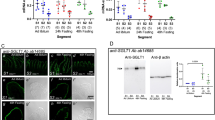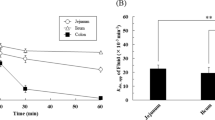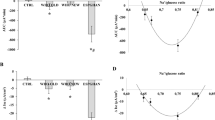Abstract
GLUCOSE disappeared rapidly from the lumen of an isolated loop of rat intestine, immersed in tyrode at 37° C. and aerated by a mixture of oxygen and 5 per cent carbon dioxide. This occurred even when the solutions (tyrode containing 200–800 mgm. per cent glucose) within the loop and surrounding the loop were identical, so that no concentration gradient of glucose existed between the inner and outer solution. The rate of uptake of glucose, during the first 15–30 min., was of the same order of magnitude as that found during resorption in vivo from similar solutions. With other sugars, the uptake was related to their rate of resorption in the intact animal. Phlorrhizin inhibited absorption of glucose in vitro as well as in vivo. It therefore seemed probable that we were dealing with ‘active absorption’ when using such a preparation.
This is a preview of subscription content, access via your institution
Access options
Subscribe to this journal
Receive 51 print issues and online access
$199.00 per year
only $3.90 per issue
Buy this article
- Purchase on Springer Link
- Instant access to full article PDF
Prices may be subject to local taxes which are calculated during checkout
Similar content being viewed by others
References
Birnie, J. H., and Grayson, J., J. Physiol., 116, 189 (1952).
Author information
Authors and Affiliations
Rights and permissions
About this article
Cite this article
HESTRIN-LERNER, S., SHAPIRO, B. Active Absorption of Glucose from the Intestine. Nature 171, 745–746 (1953). https://doi.org/10.1038/171745b0
Published:
Issue Date:
DOI: https://doi.org/10.1038/171745b0
Comments
By submitting a comment you agree to abide by our Terms and Community Guidelines. If you find something abusive or that does not comply with our terms or guidelines please flag it as inappropriate.



